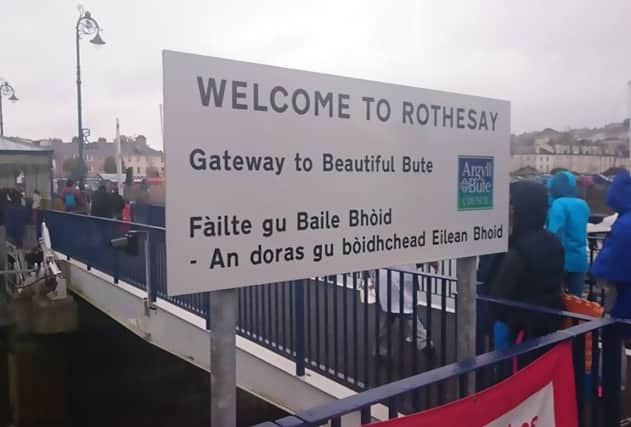Bute renamed ‘Penis Island’ in Gaelic sign blunder


The large sign greeting ferry passengers as they step on to the Isle of Bute has been in place for around nine years but it has only recently come to light it was missing a crucial punctuation mark.
Instead of “Welcome to the beauty of the Isle of Bute”, the sign proclaims “Welcome to the beauty of Penis Island”.
Advertisement
Hide AdAdvertisement
Hide AdA missing accent on just one letter changed Bhòid, meaning Bute, to Bhoid – pronounced bod – the Gaelic word for the male member.
A photograph of the sign was posted online, sparking both hilarity and outrage from Gaelic speakers.
Bute councillor Len Scoullar, an independent, said: “It makes us look bloody stupid.
“I’m not a Gaelic speaker but I would apologise to people who are Gaelic speakers and we will rectify it right away.”
He added: “I’m sure it’s the big sign the council put up many, many years ago. It would probably be about nine years ago, the exact day I don’t remember. I will make enquiries as to who ordered the sign.”
Àdhamh Ó Broin, a native dialect campaigner and Gaelic coach for the TV series Outlander, said: “It’s meant to be the genitive case, not the genital case. A genitive case is when one noun follows another and its form changes. Bhòid is Bute but Bhoid is penis. You would need the accent over the ‘O’. It says ‘Welcome to the doorway to the beauty of Penis Island’.”
He added: “You know when people speak Chinese the wrong way and they end up saying ‘Your mother is a dog’ instead of ‘The rice is nice’? It’s like that.”
Coinneach Combe, who took the photograph, said: “I actually live in Johnstone in Ayrshire. I just noticed it when I went across for the Highland Games.
Advertisement
Hide AdAdvertisement
Hide Ad“I’m a native Gaelic speaker and I’ve seen wrong spellings before but I was gobsmacked.”
Misspelled or badly punctuated signposts are not rare, particularly when they are in Gaelic.
He added: “It’s quite widespread. There’s a similar problem with the Gaelic word for festival – fèis. Without the accent it means ‘sex’.”
According to Mr Ó Broin, the Bute sign contains a further, though less attention-grabbing, error – in the word for island.
“The Eilean on the sign should actually be Eilein,” he said.
But Buteman John Durrant, of marketing firm Juggling Swords, believes most islanders will not be too upset at the error.
“I think people from Bute have a great sense of humour so most of us will probably be having a great laugh at this cock-up by Argyll and Bute Council.”
In 2010 the SNP announced a £26m plan to replace road signs with English and Gaelic place names.
Advertisement
Hide AdAdvertisement
Hide AdA 2011 census showed around 1.1 per cent of the Scottish population speaks Gaelic.
Argyll and Bute Council said the mistake has now been rectified, with the addition of a new grave accent.
The Scotsman’s Gaelic correspondent Ronnie Black said: “It’s really amazing the number of stupid mistakes that are made. Years ago it was much harder to add accents in type. It used to take 16 different finger strokes for me to produce one particular letter with an accent on it.
“Nowadays it’s inexcusable – it comes down to a lack of communication.”